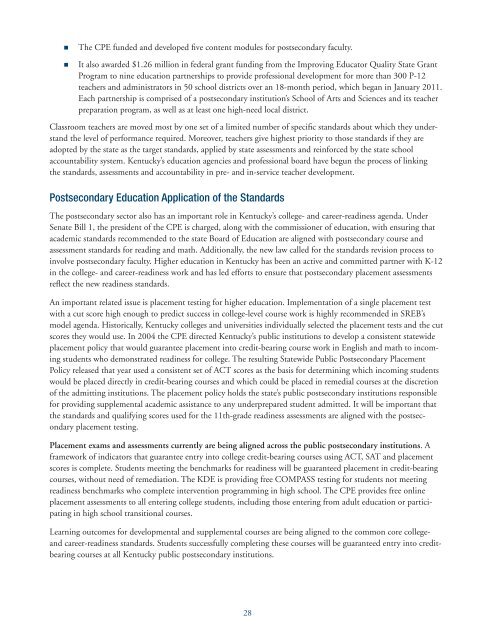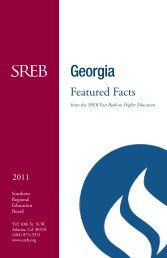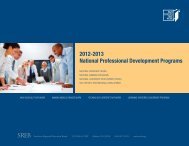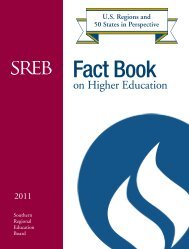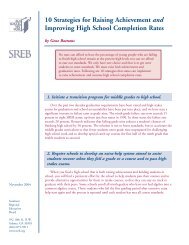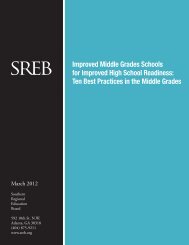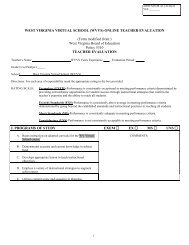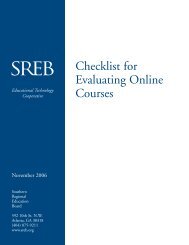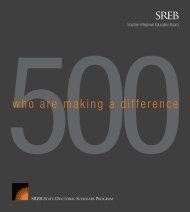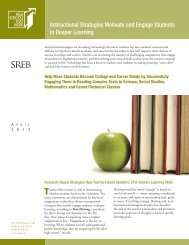Final Progress Reports - Southern Regional Education Board
Final Progress Reports - Southern Regional Education Board
Final Progress Reports - Southern Regional Education Board
Create successful ePaper yourself
Turn your PDF publications into a flip-book with our unique Google optimized e-Paper software.
The CPE funded and developed five content modules for postsecondary faculty.<br />
It also awarded $1.26 million in federal grant funding from the Improving Educator Quality State Grant<br />
Program to nine education partnerships to provide professional development for more than 300 P-12<br />
teachers and administrators in 50 school districts over an 18-month period, which began in January 2011.<br />
Each partnership is comprised of a postsecondary institution’s School of Arts and Sciences and its teacher<br />
preparation program, as well as at least one high-need local district.<br />
Classroom teachers are moved most by one set of a limited number of specific standards about which they understand<br />
the level of performance required. Moreover, teachers give highest priority to those standards if they are<br />
adopted by the state as the target standards, applied by state assessments and reinforced by the state school<br />
accountability system. Kentucky’s education agencies and professional board have begun the process of linking<br />
the standards, assessments and accountability in pre- and in-service teacher development.<br />
Postsecondary <strong>Education</strong> Application of the Standards<br />
The postsecondary sector also has an important role in Kentucky’s college- and career-readiness agenda. Under<br />
Senate Bill 1, the president of the CPE is charged, along with the commissioner of education, with ensuring that<br />
academic standards recommended to the state <strong>Board</strong> of <strong>Education</strong> are aligned with postsecondary course and<br />
assessment standards for reading and math. Additionally, the new law called for the standards revision process to<br />
involve postsecondary faculty. Higher education in Kentucky has been an active and committed partner with K-12<br />
in the college- and career-readiness work and has led efforts to ensure that postsecondary placement assessments<br />
reflect the new readiness standards.<br />
An important related issue is placement testing for higher education. Implementation of a single placement test<br />
with a cut score high enough to predict success in college-level course work is highly recommended in SREB’s<br />
model agenda. Historically, Kentucky colleges and universities individually selected the placement tests and the cut<br />
scores they would use. In 2004 the CPE directed Kentucky’s public institutions to develop a consistent statewide<br />
placement policy that would guarantee placement into credit-bearing course work in English and math to incoming<br />
students who demonstrated readiness for college. The resulting Statewide Public Postsecondary Placement<br />
Policy released that year used a consistent set of ACT scores as the basis for determining which incoming students<br />
would be placed directly in credit-bearing courses and which could be placed in remedial courses at the discretion<br />
of the admitting institutions. The placement policy holds the state’s public postsecondary institutions responsible<br />
for providing supplemental academic assistance to any underprepared student admitted. It will be important that<br />
the standards and qualifying scores used for the 11th-grade readiness assessments are aligned with the postsecondary<br />
placement testing.<br />
Placement exams and assessments currently are being aligned across the public postsecondary institutions. A<br />
framework of indicators that guarantee entry into college credit-bearing courses using ACT, SAT and placement<br />
scores is complete. Students meeting the benchmarks for readiness will be guaranteed placement in credit-bearing<br />
courses, without need of remediation. The KDE is providing free COMPASS testing for students not meeting<br />
readiness benchmarks who complete intervention programming in high school. The CPE provides free online<br />
placement assessments to all entering college students, including those entering from adult education or participating<br />
in high school transitional courses.<br />
Learning outcomes for developmental and supplemental courses are being aligned to the common core collegeand<br />
career-readiness standards. Students successfully completing these courses will be guaranteed entry into creditbearing<br />
courses at all Kentucky public postsecondary institutions.<br />
28


